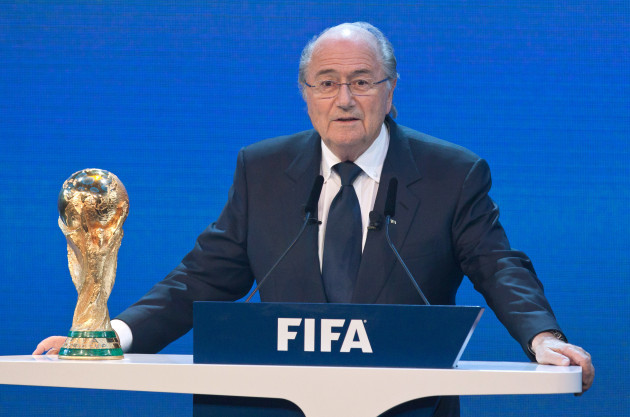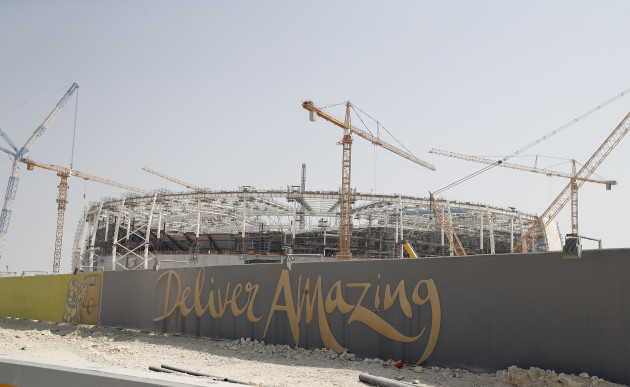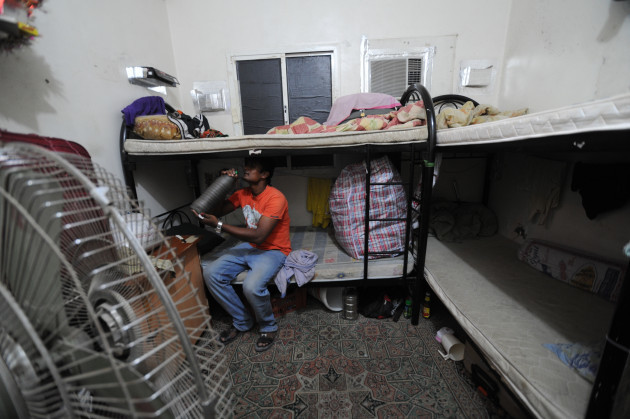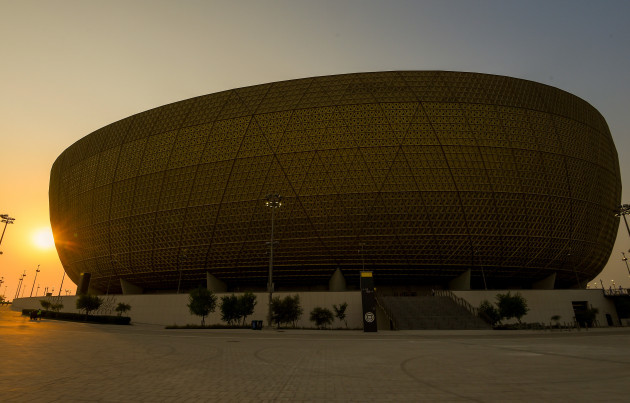THE SCALE OF controversy attached to a World Cup host has traditionally become clearer either after the tournament’s award – the 1978 edition was given to Argentina before the military junta took control – or after the tournament itself: Russia 2018 sits very uncomfortably now, already drawing parallels with the 1936 Berlin Olympics.
No World Cup was so instantly drenched in scandal and controversy like Qatar 2022, however.
Questions, questions.
Questions around how it came to be awarded: the US Department of Justice claimed in 2020 that some Fifa officials were bribed to vote for Qatar as hosts for 2022, an allegation firmly denied by Qatar.
Questions around its suitability to host one of the biggest events on Earth, only somewhat addressed by moving the tournament to the middle of the European winter.
And, above all, questions around the morality of awarding a tournament with enormous infrastructure demands to a nation whose labour laws are governed by a system that Human Rights Watch have described as being incompatible with the Universal Declaration of Human Rights.
But twelve years since Sepp Blatter surprised everyone – including himself – by drawing Qatar’s name from the envelope, the most controversial World Cup of them all looms on the horizon. (It’s 99 days from today – Fifa’s abrupt decision this week to bring the start date forward by a day scuppered our plans to run this piece 100 days out.)
With the World Cup on the horizon, anthropologist and writer John McManus spent a year in Qatar and has written a book about his experience, Inside Qatar: Hidden Stories from One of the Richest Nations on Earth.
“The debate is so polarised, in some ways”, McManus tells The42. “You have a lot of criticism, much of which is based on truth, and you have a lot of angry pushback from the Qatari side. I was interested in shading in the in-between ground, and understand what life is like there for real people who live there, whom you don’t hear a lot from.”
McManus’ encounters with migrant workers and others living in Qatar humanise the stories and make the book very accessible, but it is well-researched and scrupulously fair, making his criticisms all the more biting.
I ask if he believes awarding a World Cup to Qatar is morally wrong.
“It pains me that the first time it comes to the Middle East and the Muslim world, that factor has rightly been buried under the other negative factors of giving it to a small country without infrastructure in place and with labour laws that are highly exploitative.
“The World Cup has brought greater attention to the country and as a result the International Labour Organisation have been there, helping to reform laws. On paper and to a degree in practice, things have changed. Not far enough, and it’s a shame it needed such an external push.
“Do I think there are benefits that have accrued from giving the World Cup to Qatar, in terms of improving workers rights? Yes. Do they go far enough? No.
“Does that render awarding the World Cup to Qatar in the first place wrong…I think the workers and the people who live in the country were not the primary concern for the 15 individuals who awarded them the tournament.”
Every non-Qatari citizen working in Qatar is employed under the kafala system, meaning they require a resident sponsor for their right to work and reside in the country.
The system dates from a principle of guarantorship in traditional Islamic teaching, whereby it would be religiously incumbent on a kafeel, or sponsor, to guarantee the rights of the weak and vulnerable without demanding anything in return.
As McManus explains in his book, that last point is the most crucial: there was nothing inherently exploitative in this system, but its meaning has become utterly warped across the last century. He explains the first shift in the system’s meaning was instigated by the region’s British colonial rulers, for it was they who first extended the system of sponsorship to include labour. From the 1920s they set up a system of entry and exit visas and work permits, and when migration exploded following the discovery of oil in 1939, they passed on the responsibility to manage the system to individual employers.
McManus quotes historian Omar AlShehabi, who describes this decision as an “early British foray into outsourcing – a way to control labour and police empire on the cheap.” The system’s room for exploitation has only grown since, and up to recently forbade workers from changing jobs or leaving the country without their employer’s permission.
Native Qataris today make up just 11% of the country’s population, and they are vastly outnumbered by the country’s migrant workforce: 94% of the workforce in Qatar come from abroad. The majority of these are Asian and African workers coming from poor countries to work in construction, and the migrant worker population swelled by 40% to 2.1 million ahead of the World Cup.
Kafala, McManus writes, “is the underpinning structural factor in worker exploitation and abuse.”
Much of that exploitation takes place in the gap between the protections that exist on paper and their lack of implementation in reality. Qatar worked with the International Labour Organisation and made significant chances to the kafala system in 2017, but McManus and Amnesty International have accentuated serious failures of implementation.
Recruiter fees are prohibited in Qatar but McManus writes that they happen anyway, whereby workers stump up a fee from home to a middleman who arranges a job for them in Qatar. A 2020 Amnesty International report described passport confiscation as appearing to be widespread – despite laws banning it without written permission.
McManus also highlights the issue of contract substitution, where a worker is presented with different, inferior pay terms on arrival. When there, workers are housed in cramped labour camps outside Doha, which the aforementioned Amnesty report described as insanitary, where they sleep, per Amnesty, in bunk-beds in overcrowded rooms.
The Amnesty report interviewed 59 current and former employees across eight different companies found some workers being forced to work 84-hour weeks, even though Qatari employment law imposes a maximum of 60 hours a week. Twenty-nine of those interviewed claimed to have regularly worked 12-hour days and 28 said they were routinely denied a weekly rest day. One Bangladeshi security guard had not had a day off in three years.
Reforms included the introduction of a minimum monthly wage of 1,000 Riyals – around €252 – which equates to an hourly rate of €1.21 for a 48-hour, six-day week in one of the world’s richest countries. One worker said he had been fined 500 Riyals (€126) – half his basic monthly wage – for not tucking in his shirt properly after using the bathroom.
The tournament organisers have consistently defended themselves on the subject, and at the draw for the tournament earlier this year, the Secretary General of the Supreme Committee for Delivery and Legacy, Hassan al-Thawadi, responded to earlier criticism from the president of the Norway FA by saying, “We have always had the doors open for anybody who wants to understand the issues, who wants to educate themselves before passing any judgment.”
But as McManus writes pithily and with understatement, “there is a gap between the discourse and the reality” on labour reform.
The tournament organisers reacted to a Guardian report in February 2021 that 6,500 migrant workers had died from 2010 to 2020 – 37 of them directly working on World Cup sites – by claiming the report was an act of sensationalism, saying deaths are proportional to the size of the migrant population. Fifa president Gianni Infantino, meanwhile, claimed there have been three deaths, drawing on what organisers have classified as “work-related deaths.”
McManus explains the problem with attributing deaths to working conditions: the data is insufficient, highlighting “huge gaps” in the way Qatar’s National Trauma Registry records deaths and severe injuries, as they don’t include “fatalities that occurred before the person arrived at hospital, deaths are not disaggregated as work or non-work related, and Qatar’s list of occupational diseases does not include deaths resulting from heath stress.”
But arguing over the precise number of deaths involved in preparing for a football tournament is a moral absurdity, and Nicholas McGeehan of human rights advocacy group Fair Square speaks with clarity in McManus’ book. “This is the wrong argument. It shouldn’t be about how many people are dying. The argument should be about the number of unexplained deaths.”
“I spoke to [McGeechan] at one point about Qatar’s response to this criticism”, McManus tells me. “He said, ‘I have a simple answer – then don’t host the World Cup.’”
The kafala system is in operation across the Gulf – including in Saudi Arabia, Bahrain, Kuwait, Oman, and the United Arab Emirates – but Qatar’s bid for the World Cup has meant attention has focused almost entirely on them. There is also ambivalence in the country toward the tournament: I was struck by just how few of the conversations recored by McManus in his book even mention the World Cup.
So why, exactly, did Qatar want to host this thing?
“There are conflicting elements within the Qatari state and Qatari society, and there are very ambitious leaders and certain individuals within the royal family and within the Qatari elites who want the country to become globally successful”, says McManus. “It’s also a hedge against larger, regional neighbours. The country is wedged between Saudi Arabia and Iran, and in the Gulf crisis which began in 2017 there was genuine fear that Saudi Arabia were going to invade Qatar.
“Part of the point of getting themselves known and on the global map through sport – and becoming the site of a US military base – is a bulwark against being invaded by a larger nation, which happened to Kuwait in 1990, by Iraq. That, from certain decision makers in power, is one of the motivations for hosting things like the World Cup.”
Sport, he continues, was also envisioned as part of Qatar’s future, but that point in time keeps getting delayed.
“Given the West is trying to wean itself off Russian hydrocarbons, places like Qatar are becoming even more important”, says McManus. “In the short term it’s going to ramp up gas production hugely and revenues will really increase, but in the longer term, there needs to be a modus operandi for something more sustainable not linked to hydrocarbons.
“That point in time keeps getting shunted back a bit. Sport, and the World Cup, was meant to be one plank in this post-carbon future, but it feels the country is still so overly-reliant on its hydrocarbon wealth.”
I ask what surprised him most about his time in Qatar.
“People often knew what they were getting into when they were coming into the country. Especially low-paid migrants. Even with those sympathetic to their plight, there is a tendency to remove agency from people at the lower end of the spectrum and present it as a case of them being hoodwinked and cheated into these terrible conditions. That is the case for some people, but I was surprised at how many people knew exactly what they were going into. They knew exactly the risks, the chances of being ripped off and treated terribly, and perhaps putting their health on the line, and yet they still decide to go.
“That is a really interesting point. Why? The book is about Qatar but it’s also about global inequality and how desperate people feel within it. That the only way in which they can significantly improve their life chances and ensure their kids don’t grow up as they did is to take these enormous risks is a profoundly sad reflection on the world more broadly rather than strictly Qatar.
“That was the theme I wanted to emphasise. Qatar is a more visible manifestation of the wider issues that we face in the world, where the t-shirt you’re wearing now could possibly have been made in Bangladesh for peanuts. But we can’t see the chain that gets it from there to us quite so readily as we can see it in Qatar, where everyone is there together and the Ferrari is being driven down the road by a guy being paid peanuts.
“It’s just a more condensed point on earth where these things are unfolding. That’s not to let Qatar off the hook, but to understand the place it must be seen within the wider global position.”
In 99 days’ time, the global game will collide with a stark reality of globalisation.
Inside Qatar: Hidden Stories from One of the Richest Nations on Earth by John McManus is published by Icon Books and is available now




